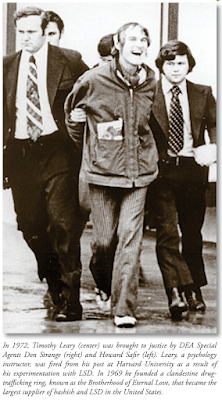 Having been established by Richard Nixon on July 1, 1973, the U.S, Drug Enforcement Agency (DEA) is celebrating its dubious 50-year legacy pushing the racist, ineffectual and expensive War on Drugs. Nixon called for Congress to consolidate anti-drug efforts into the uber agency, which was given intelligence powers like wiretapping and body-worn recorders.
Having been established by Richard Nixon on July 1, 1973, the U.S, Drug Enforcement Agency (DEA) is celebrating its dubious 50-year legacy pushing the racist, ineffectual and expensive War on Drugs. Nixon called for Congress to consolidate anti-drug efforts into the uber agency, which was given intelligence powers like wiretapping and body-worn recorders.
One of the DEA's high-profile busts was the arrest of Dr. Timothy Leary, the Harvard psychiatrist who became an evangelist for LSD. Leary's legal challenge to the 1937 Marijuana Tax Act after being caught with pot at the Mexican border dismantled that law, but ushered in the much-worse 1971 Controlled Substances Act, which gave DEA the authority to schedule drugs based on their perceived danger, leaving cannabis in the most dangerous Schedule I category to this day.
DEA TRIES TO BE HIP IN TEEN CAMPAIGN
As reported by
Marijuana Moment, the DEA is now promoting tips on how to get a “natural high” as
an alternative to drugs, sharing what it says are “7 Better Highs” such as becoming famous on Instagram, playing video games and going to a pet
store to look at animals.
"Don’t let boredom be one of the reasons you try drugs. Try these fun activities and get a natural high!"
the agency's taxpayer-funded campaign enjoins, suggesting hiking, renting jet skis, or going to amusement parks for relaxation and excitement in lieu of doing drugs.
“It’s fun to post pics on Instagram and also see what your friends are doing on the app. But if you took it a little bit more seriously, you could take over the world and become a young trendsetter,” the post continues.
But social media could be more harmful than marijuana is to young people, especially girls.
A 2021 report reviewed by the Wall Street Journal found that about 22 million teens log onto Instagram in the U.S. each day, and that adolescents were starting to report anxiety, depression, and even suicidal thoughts regarding their experience on the social app. Thirty-two percent of teen girls said that when they felt bad about their bodies, Instagram made them feel worse.
Data suggest that the more hours a child devotes to social media, the higher their risk for mental health problems.
“Do you want to take a little escape from reality altogether?” the DEA site asks. “Playing video games is an awesome way to do so.” This from the government that
continues to recruit teens excelling at online war games into the military, as
77% of young people don't meet the military's requirements due to obesity, drug and alcohol abuse, and medical/physical health issues.
FEDERAL POLICIES CONTINUE TO FUEL ILLICIT DRUG MARKET
Journalist Jill Jonnes helped create the
DEA museum and published the 1996 book
Hep-cats, Narcs, and Pipe-Dreams: A History of America's Romance with Illegal Drugs with a National Endowment for the Humanities fellowship. In her book,
she writes, "Oddly enough, it was not the states or the national reform movements that launched the fight for federal antidrug laws and pushed them through. Instead, it was the U.S. State Department. Why ever for? one might well ask. Initially, the State Department's surprising interest in drugs had everything to do with designs on the vast China market and currying favor."
It's been well documented that the British forced China to accept opium from its Indian colonies in order to restore balance of trade with its tea-producing partner, leading to two Opium Wars (1839-42 and 1856-60). After the Spanish-American War of 1898 made the United States a colonial power, "American businessmen and reformers saw a natural opportunity to advance their respective causes by actively supporting China's desire to end all opium imports,” writes Jonnes. So as the British had conquered the East by pushing an addiction on them, the U.S. would do so by attempting to fight that same addiction.
In 1914 the Harrison Narcotics Act passed, forbidding doctors to prescribe to “addicts,” and the underworld moved in. Not long afterwards, as the DEA museum demonstrates, tincture bottles were replaced with submachine guns.
It was reported in 2021 that
the U.S. has spent over a trillion dollars on the War on Drugs, yet drug use is up, as are overdose deaths. Cracking down on opiates arguably led to the advent of fentanyl, which is now being mixed with the next-more-dangerous drug,
xylazine. This year, the DEA's budget is $3 billion to continue this madness.

Meanwhile, one cannabis company
celebrated the upcoming 250th anniversary of the Boston Tea Party by staging a similar protest (pictured) against the federal 280e tax policy, under which cannabis businesses are unable to deduct the usual business expenses like rent from their federal taxes.
It's one of the many ways that federal prohibition and overtaxation and regulation at the state level continues to cripple the legal cannabis market instead of letting it flourish and take business away from the illicit one. And by keeping marijuana illegal while legalizing industrial hemp, the feds have unleashed
unlicensed, intoxicating hemp products on the market.
Oregon has now legalized psychedelic therapy, and other states and cities are moving to legalize or decriminalize it, while
the VA studies MDMA for treating PTSD. Dr. Leary would get a kick out of that, although I'm sure that he, like others, would rather not have been persecuted by the ongoing War on People Who Use the Wrong Drugs. And
don't expect relief anytime soon.
UPDATE 7/19: YOU COULDN'T MAKE THIS UP DEPARTMENT
The DEA’s second-in-command has quietly
stepped down amid reporting by The Associated Press that he once
consulted for a pharmaceutical distributor sanctioned for a deluge of
suspicious painkiller shipments and did similar work for the drugmaker
that became the face of the opioid epidemic: Purdue Pharma.
Read more.

 Meanwhile, one cannabis company celebrated the upcoming 250th anniversary of the Boston Tea Party by staging a similar protest (pictured) against the federal 280e tax policy, under which cannabis businesses are unable to deduct the usual business expenses like rent from their federal taxes.
It's one of the many ways that federal prohibition and overtaxation and regulation at the state level continues to cripple the legal cannabis market instead of letting it flourish and take business away from the illicit one. And by keeping marijuana illegal while legalizing industrial hemp, the feds have unleashed unlicensed, intoxicating hemp products on the market.
Meanwhile, one cannabis company celebrated the upcoming 250th anniversary of the Boston Tea Party by staging a similar protest (pictured) against the federal 280e tax policy, under which cannabis businesses are unable to deduct the usual business expenses like rent from their federal taxes.
It's one of the many ways that federal prohibition and overtaxation and regulation at the state level continues to cripple the legal cannabis market instead of letting it flourish and take business away from the illicit one. And by keeping marijuana illegal while legalizing industrial hemp, the feds have unleashed unlicensed, intoxicating hemp products on the market. 
No comments:
Post a Comment